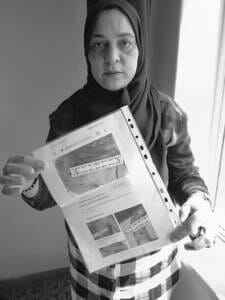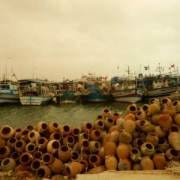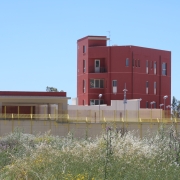Jalila’s struggle is ours too
Article first published on May 5, 2021
A few days ago Jalila managed to repatriate the bodies of her children Hedi and Mehdi, who died in a shipwreck in the Mediterranean in an attempt to reach Italy. Thanks to her today the two boys are no longer faceless castaways.
Against the border policies that kill and against the silencing of these tragedies, the story of Jalila is a precious contribution to the denunciation and struggle for the construction of a collective memory on the Mediterranean that opposes the denial of migrants’ stories and rights.
Jalila’s brave journey
Hedi and Mehdi, two young Tunisians aged 24 and 22, left Bizerte on a small boat in November 2019 to reach Italy: victims of a shipwreck, their bodies were found in the first months of 2020 on the Sicilian coasts between the provinces of Palermo and Messina. Jalila recognized her children from the photos of the tattoos of the castaways‘ bodies released by the Termini Imerese Prosecutor’s Office.
Since that moment, she has not been stopped: she contacted Italy, did research on the internet, reached out to the Tunisian and Italian institutions until she got answers. In her quest, she was assisted by Serena Romano, a lawyer whose precious and fundamental work aim finding the truth and justice for other young people who died in that shipwreck is continuing.
Once she had the biological comparison with the DNA test made, which confirmed the identity of Hedi and Mehdi, Jalila processed this pain and transformed it into a motivation to bring them back home. From Tunisia, she spread the word about her story all up to Italy in order to tell the fate of her children: they dreamed of Europe like so many migrants but the possibility of traveling safely was denied to them. Before leaving Tunisia, the two boys told their family: “We want to leave this prison, we want a new world to live in”.
They died at sea, like thousands before and after them, along with traveling companions Kais, Enis and Akram.
Consequently, Jalila got a visa from the embassy and crossed the sea that submerged her children. When she arrived in Palermo, thanks to the work of lawyer Romano, Jalila completed the legal and bureaucratic process necessary to repatriate the bodies and resumed the journey back to Tunisia, in order to return their missing loved ones to the boys’ father and Nourhene, her other daughter. After so much suffering, she returned home to Bizerte with her children, crossing that sea that took them away from her.
Jalila came to bring her sons back, she rescued them from the oblivion of a nameless death, she transformed anonymous coffins into bodies to remember. She has vindicated their story; she has given explained the motives of those who leave and has exposed the responsibilities of those who kill. She has fought the criminalization of her children, who are pointed out by the newspapers as drug traffickers, by denying the relationship of the two young people with an international drug trafficking and by identifying the real criminals: the death policies that govern European borders.
Jalila did all this with great courage. She was also supported by the associations Carovane Migranti, Accoglienza ControVento, Rete Antirazzista Catanese, Borderline Sicilia, LasciateCIEntrare, Forum Antirazzista Palermo.
In order to support the costs of exhumation and repatriation, Jalila has launched a fundraising campaign, which is now concluded, and with which she has collected the necessary money, thanks to the crucial contributions of individuals and solidarity associations. The significant participation of many people contributed to the success of this small act of justice.
The backbone of Tunisian women’s memory
With extraordinary strength, during her stay in Sicily, Jalila also worked hard for the other Tunisian women in search of their children and brothers: Awatef, Fatma, Raja and others.
While she was fighting for her own children, she was also thinking about of others’ children and trying to support the other women in gathering more information about the disappearances. She personally got involved in the research because: “Mothers have to fight otherwise nothing moves. We push, we push for the truth. If one path does not work, we take another one to find another solution. We are mothers and we want justice for our families”.
And that’s how it happened. Back to Tunisia, Jalila tells about the meetings with the mothers of the other disparus: she is already thinking about the construction of a memorial for the children, the meaning of their death, the possibility of making sense off of these disappearances with a commitment that contrasts this political and human barbarism: “My children were the roots of research, now they will be the roots of justice for all the children of the Mediterranean. In the face of these crimes, we cannot remain idle.”
And then Jalila began to sew: thread in hand, she started the story and used it as the weft of the large Yusuf blanket created in Lampedusa with the Lampedusa Solidale Forum.
Sewing began to intertwine her memory with those of other families and other mothers who have experienced similar tragedies in the Sicilian channel and in the Mediterranean waters.
The fight for the dead in the Mediterranean is everyone’s fight
We often forget that this struggle is not only for the dignity and respect of the death of those who disappeared in the Mediterranean, but it is a struggle for the living since the death of migrants who are subjected to violence also affects their families and acquaintances. It is an urgent fight, because it is linked to those who are waiting for answers, to those who pray, asking to know for certain whether their family members are alive or dead, to those who hope to get back a body or to perform a farewell rite, to those who call out to silent institutions, to those who wonder how it would have gone if these men and women who crossed the sea were born in a part of the world where mobility is not a crime.
Not only that, as it is also a necessary fight of those who have the privilege of living on the other side of the Mediterranean: not exclusive to those who have suffered the loss directly, but also to those who are direct or indirect witnesses, of those who cannot ignore this humanity being submerged, of those who defend the freedom of movement, of those who oppose the drowning of rights in a Mediterranean area which – it should not be forgotten – is an integral part of our history.
We cannot let the fascist and racist securitarianism that kills migrants go on. It is a common battle, of all of us who oppose the extermination taking place along the borders, because these deaths are not individual crimes suffered by some families, rather political responsibilities that challenge us.
And therefore, supporting the fight for the recognition of the disappeared and remembering them is not of less importance: it is the only way not to give in to historical repression, not to surrender to the violence at the borders, not to be – even minimally – an accomplice in the total denial and devaluation of the migrants’ lives, to the dis-integration of their bodies and to the principle of inequality of existences supported by the European necropolitics.
It is precisely for this reason that Jalila’s battle is a battle that we actively make ours: we build a common memory so as not to allow the void of these disappearances to be filled, nor that the wound is healed, so as not to let the guilty go unpunished and the truth be removed.
Truth and Justice
Back home, Jalila affectionately thanked her Italian friends for the welcome she received. I think with anger at that welcome that her children did not have. Instead, by chance she managed to gather around her with strength: a human and political presence to counter the emptiness of that loss, a precious defence from her lawyer who is still in search for truth and responsibility, support from associations that have never left her alone, a hand from people in solidarity who have cheered and supported her, near and far.
We owe it to you, Jalila: we amplify your voice, we support your cause, we collectivize your pain and your courage. And we make them ours.
We will keep your memory as a precious piece of resistance in the common narrative of this history of violence.
And we promise you that in this extermination – which one day history will recognize as such – we will never be dormant and indifferent spectators. We are your vigilant allies, stubbornly engaged in the common battle for the rights of migrants killed at the borders. By your side for truth and justice.
Silvia Di Meo
Borderline Sicilia
Translated from Italian by Anna Doumbia





